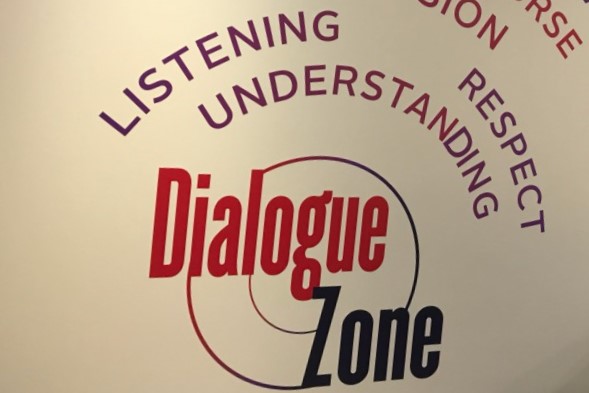Blogs

First Cohort of Facilitators Convenes
By Jason Combs
The first cohort of facilitators for the Dialogue Zone met this week to explore opportunities for faculty, staff, and students to engage each other on key topics affecting campus. Twenty-six people from various offices and departments across the University spent a morning together, reviewing key skills, principles, and approaches for facilitating dialogue.
Dialogue involves risk as people share their honest views with others who, apart from the expectations of dialogue, might fall into patterns of criticizing, judging, or attacking those who do not share these views - unfortunately, so familiar in today’s world. Facilitators serve by helping the participants to create an environment in which they can find the courage to share these views and trust that others will respect them as they do so. They also help the participants to explore views in greater depth once they have been shared.
Many of the individuals in the cohort have been facilitating dialogue on campus and in the wider community for years. However, the establishment of this cohort of facilitators creates an opportunity for these people to come together as collaborators in a collective learning process. Although many people in the cohort have had formal training, the facilitators have come together with the understanding that they are co-learners within a larger process of building capacity on campus. As work in the Dialogue Zone unfolds, they will be assisting many others to explore in a non-adversarial manner topics that otherwise might divide people into opposing parties or camps. As people participate in dialogue, their capacity for engaging in it increases. However, the facilitators also learn. Through the act of facilitating, they build their own capacity for engaging in dialogue but from a different angle. In this way, the facilitators are not experts who operate outside the capacity-building process, but rather co-learners within that process, whose efforts to learn include accompanying other participants.
In this way, for UD as an organization, capacity for dialogue builds not only at multiple levels, but also is progressive, for in time, those who are being assisted by one of these facilitators might arise to assist others in similar ways. This cohort of facilitators is the beginning of an expanding process of building capacity. Most of the individuals in this initial cohort had the shared experience of participating in a training that took place at UD years ago focusing on the University of Michigan’s intergroup dialogue (IGD) model. Others participated in a similar training at Hope College involving a similar model afterwards. Each year, as capacity builds across campus, new people might serve as facilitators in the Dialogue Zone.
In the coming weeks, the facilitators will be working together to identify key topics around which dialogues involving fellow faculty, staff, and students might be arranged. They also will have opportunities to continue their own training by attending sessions that focus on specific skills for facilitation. Periodically, the facilitators will come together to reflect on what they are learning through practice. Over time, a collective body of experience can accrue, one that draws from the wider field of scholarship and practice, but also includes its own local knowledge of best practices, principles, and approaches that have borne fruit here at UD.
If you have ideas for topics around which one or more dialogues might be facilitated in the Dialogue Zone, please let us know by sending an email to dialoguezone@udayton.edu. As dialogues on key topics become open to people on campus for participation, information about how to register will be made available through the Dialogue Zone’s website, which will be launched in the coming weeks.
